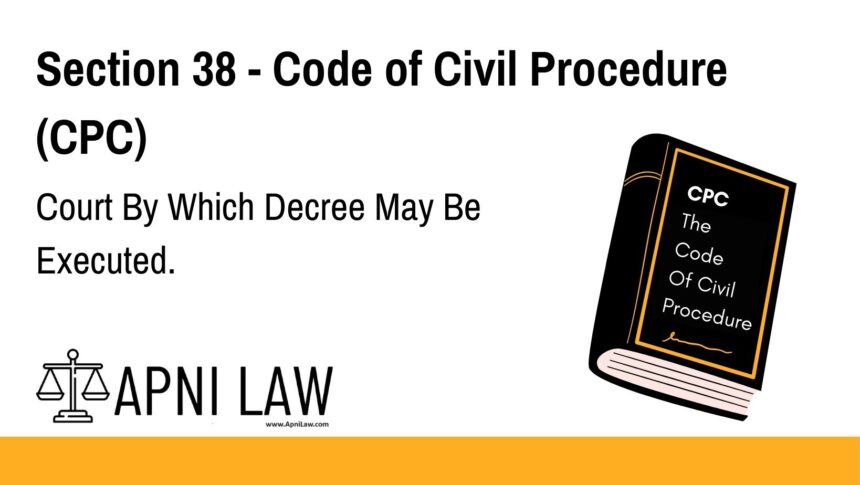Code
CPC (1) A decree may be executed either by the Court which
passed it, or by the Court to which it is sent for execution.
Great 👌 This is Section 38 CPC – Court by which Decree may be Executed. I’ll now prepare the SEO-optimized article in the same ApniLaw format as before.
Section 38 CPC: Court by which Decree may be Executed
Code
Section 38 – Code of Civil Procedure
(1) A decree may be executed either by the Court which passed it, or by the Court to which it is sent for execution.
📖 Source: Section 38 CPC – Court by which Decree may be Executed (ApniLaw)
Explanation
Section 38 CPC deals with the jurisdiction of Courts in executing decrees. It provides two clear options:
- By the Court which passed the decree – Normally, the decree is executed by the same Court where the case was originally decided. (Read Section 37 CPC for the meaning of “Court which passed a decree”).
- By another Court to which it is sent for execution – If required, the decree can be transferred to another competent Court for execution under Section 39 CPC.
This section ensures that decrees remain executable across jurisdictions, preventing technical barriers in enforcement.
Illustrations
- Example 1:
A money decree is passed by District Court A. The judgment debtor has property within District A. The decree can be executed by District Court A itself. - Example 2:
The same decree-holder discovers that the judgment debtor also owns property in District B. The decree may be transferred to District Court B for execution. - Example 3:
A trial Court passes a decree, but due to territorial reorganization, the judgment debtor’s assets fall under another Court. The decree can be executed by the transferee Court once it is formally transferred under Section 39.
Common Questions and Answers
1. Which Courts can execute a decree under Section 38 CPC?
- The Court which passed the decree.
- The Court to which it is transferred under Section 39 CPC.
2. Does Section 38 allow simultaneous execution in two Courts?
Yes, execution can proceed in both Courts if properly transferred, but generally the decree-holder chooses one Court.
3. What if the judgment debtor has property in multiple jurisdictions?
The decree-holder can seek transfer of the decree to all such jurisdictions under Section 39 CPC.
4. Can an appellate Court execute a decree?
No, execution lies in the Court of first instance or the Court to which it is transferred. (See Section 37 CPC).
5. Why is Section 38 important?
It ensures flexibility – the decree can be executed either locally (same Court) or elsewhere (transferee Court), depending on the judgment debtor’s assets.
Conclusion
Section 38 CPC provides that a decree may be executed either by the Court which passed it or by the Court to which it is transferred. Together with Section 37 CPC and Section 39 CPC, this section creates a complete framework for jurisdiction in execution proceedings, ensuring decrees remain enforceable across different Courts.
👉 For more details, visit: Section 38 CPC – Court by which Decree may be Executed (ApniLaw).








